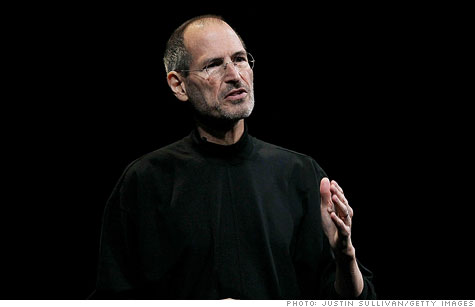
Steve Jobs is slated to speak next week at Apple's event launching iCloud.
NEW YORK (CNNMoney) -- Apple took the unusual step Tuesday of pre-announcing what it would discuss at next week's Worldwide Developers Conference, but it made an even more out-of-character move by revealing a new product before Steve Jobs had a chance to unveil it.
The company said it would launch iCloud, which it described as "Apple's upcoming cloud services offering."
Jobs will shed more light on iCloud during a keynote that will kick off Apple's annual WWDC conference on Monday at 10 a.m. PT in San Francisco, but digital media experts are already abuzz about what iCloud might offer.
Analysts say one thing is for sure: Apple's new service will have to be more than just an online media locker a la Amazon Cloud Drive or Google Music.
Apple (AAPL, Fortune 500) has been rumored to be working on developing a cloud music service for years, but it was beaten to the punch by Amazon (AMZN, Fortune 500) and Google (GOOG, Fortune 500), which debuted their own online music services earlier this year. Those services allow users to stream their entire libraries over the Internet to any device, but they require people to upload their music to the companies' servers. That can literally take days.
"Apple has to play the classic early follower strategy of seeing the mistakes made by others and learning from them," said Mark Mulligan, an independent music industry analyst. "Amazon is limited in scope and doesn't offer a groundbreaking user experience. Apple will err on the side of great user experience first and rich functionality second."
So what will that look like?
Scan and match: Analysts believe Apple's iCloud will offer several added benefits, including so-called "scan and match" capabilities. Apple is reportedly negotiating licensing deals with record labels so that iTunes can scan users libraries and match those songs with online versions hosted on Apple's servers. That will allow users to stream any song in their library without uploading their music.
Apple will probably allow users to listen to their entire libraries online, analysts predict, not just the music they purchased on iTunes. Just a quarter of iTunes users download music regularly from the iTunes music store, according to Mulligan. Most music stored in iTunes comes from ripped CDs or peer-to-peer networks.
"If it's restricted to just iTunes purchases, it wouldn't be a viable proposition," he said.
Subscription service for a fee: The downside is that those streaming licenses don't come cheap, and iCloud will likely charge a subscription fee. Amazon and Google, by contrast, offer their cloud music products for free.
Most analysts think the price will likely be about the same as Apple's current cloud service offering, called MobileMe. That service, which is available to customers for an annual $99 subscription, allows users to upload content to Apple's servers, sync data with multiple devices and access content via the Web.
MobileMe never really caught on with customers. It has been plagued by bugs, and Fortune reported that Jobs lambasted the development group for its failure. Analysts widely believe that iCloud will replace MobileMe as Apple's cloud offering.
That $99-a-year price point would put iCloud's cost on par with other music subscription services like Napster, Microsoft's (MSFT, Fortune 500) Zune Pass or Rhapsody, which typically cost between $10 and $15 a month. Those services have deals in place with record labels, which allow users to stream millions of songs -- considerably more than exists in individual iTunes libraries.
More than just music: Many pundits believe iCloud will eventually -- if not at launch -- allow users to stream TV shows and movies as well.
"Just offering music wouldn't get a lot of iTunes subscribers interested," said Mike McGuire, analyst at Gartner. "It would have to be a multimedia subscription service, including movies, TV shows and music to create a more compelling experience than what's already out there."
McGuire said the conundrum Apple will likely face is whether to run an unlimited media streaming subscription service that competes with Netflix or to license deals with movie and TV studios so that users can watch only video content that exists in their iTunes libraries.
As services like Netflix (NFLX) and video on demand become increasingly popular, fewer people are buying individual videos and TV shows, so most iTunes video libraries are looking pretty thin. But competing with Netflix directly could prove difficult for Apple. That's why McGuire believes Apple will extend its Apple TV model to the iCloud service, offering one-time streaming rentals for under $5.
Just iOS: A common criticism of Apple is that it offers a "walled garden" approach to technology: The user experience is great, but you have to stay inside the Apple ecosystem to make it work. That's why you'll probably need an iPod, an iPad or an iPhone to make iCloud work.
"What is the reason they're doing this? To make the experience around their devices better so they sell better," said Mulligan.
One rival said that's why iCloud won't kill off the competition.
"Even if it's a huge success, Apple will only care about Apple products," said Daren Tsui, CEO of cloud music service mSpot. "They don't care about other platforms like BlackBerry or Android. But we're the Switzerland for media, because we work on all platforms." ![]()